Advertisement
In a study on over 4,000 middle-aged Japanese, it was found that fast eaters tended to be heavier – and had gained the most body weight since age 20.
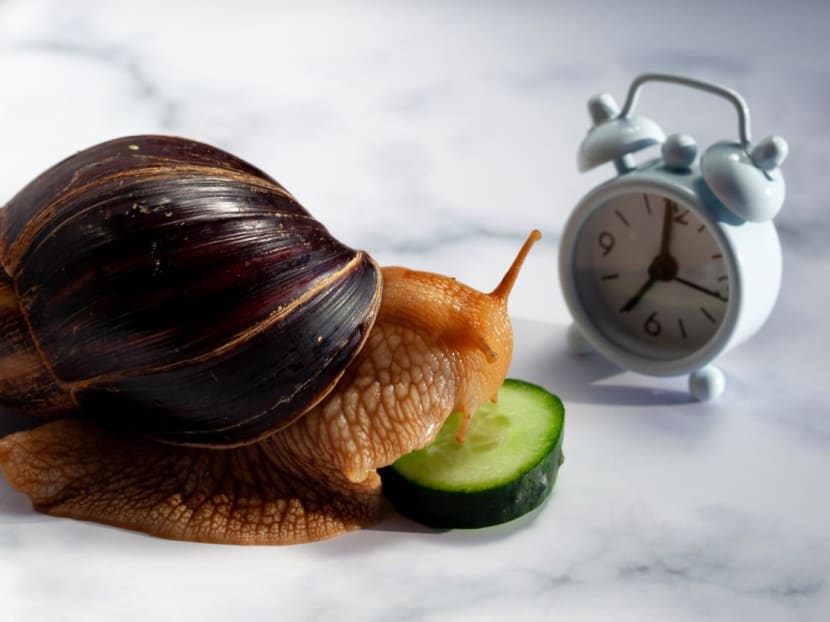
(Photo: iStock/A.Greeg)
New: You can now listen to articles.

This audio is generated by an AI tool.
If you’ve shared a meal with someone who is a slow eater, you might have stabbed yourself with a fork – or just move on to dessert.
That’s because watching slow eaters in action is as painful as sitting through a torture scene in a movie. Each spoonful of food – slowly and laboriously delivered to the mouth – is deliberately chewed like a century-old Galapagos tortoise. And heaven forbid you start a conversation with the person; you’d still be there when the staff comes around and enquires your last order for the day.
The opposite of a slow eater is just as perplexing. The fast eater might already be putting down his cutlery when you’re just taking your first bite. Food slides down these voracious feeders’ throats without a seeming need to chew. And forget about taking pictures for the ‘Gram; you won’t get the chance.
So why do some people take forever to finish a meal while others wolf down theirs in minutes? Will there be potential health issues? And can you change your eating speed?

WHAT QUALIFIES AS SLOW AND FAST EATING?
Slower eaters typically take longer than 30 minutes to finish a meal, while quick eaters make short work of theirs in less than 20 minutes, according to Dr Jessica Beh, a family physician with DTAP@Robertson.
“The average duration most adults take to finish a meal can vary, depending on individual eating habits and cultural norms,” she said. “A common range is about 30 minutes for a main meal and 20 minutes for a snack.”
WHY ARE SOME PEOPLE SUCH SLOW EATERS WHILE OTHERS ARE THE OPPOSITE?
If you’re a slow eater, it may have to do with distractions during mealtimes or dental health issues, said Dr Beh. “People who tend to eat while engaging in other activities such as watching TV, reading, working or having conversations with dinner mates may eat slowly because their attention is divided between eating and the other activity,” she said.
Pain from poorly fitted dentures or other oral health issues can make chewing difficult and slow, added Dr Beh, whereas some individuals simply prefer to eat slowly, taking their time to savour each bite.
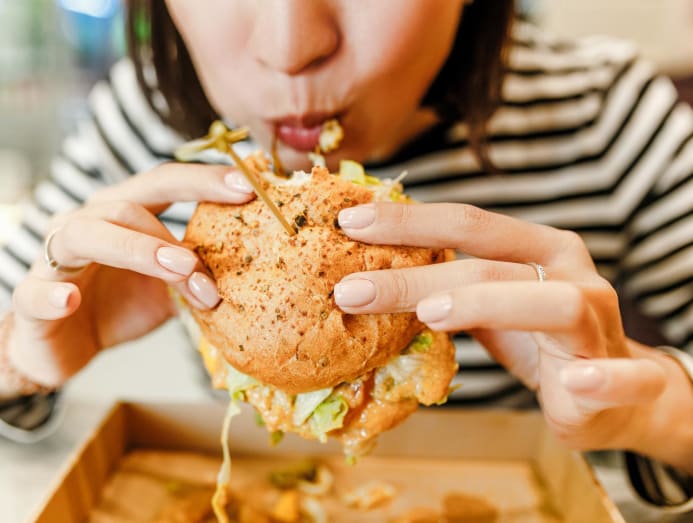
The quick chompers, on the other hand, may be conditioned to eat fast by their busy lifestyles, said Dr Beh. “This is common among individuals with demanding jobs, students and parents who may have limited time to eat.”
Such eating habits could also be formed in childhood when they were pressured by parents to finish their meals quickly, said Dr Beh.
Sometimes, stress, anxiety or emotional distress can affect eating patterns as well, said Dr Leslie Heinberg, a professor with Cleveland Clinic’s Psychiatry and Psychology department, on Cleveland Clinic. Eating quickly might provide temporary relief or distraction from negative emotions.
Or you’re simply very hungry. “If someone tends to wait until they are extremely hungry before eating, this can disrupt natural hunger signals and they may eat quickly to satisfy their hunger rapidly,” said Dr Beh.
“Overtime, the habit of eating too slowly or quickly become ingrained in individuals and dictate the speed at which they eat on a daily basis,” she added.
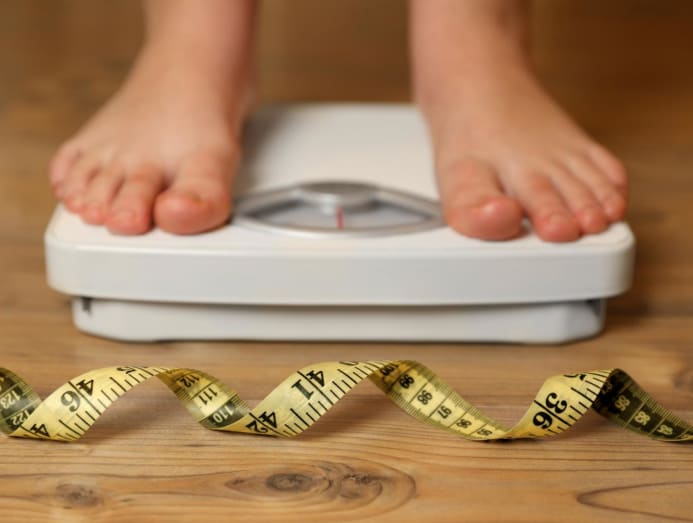
ARE THERE ANY HEALTH ISSUES THAT CAN ARISE?
Between slow and fast eaters, the former appears to have an edge over the fast ones. In a study that examined weight change in 529 men over eight years, fast eaters gained more than twice as much weight as slow or even medium-paced eaters. Another study on over 4,000 middle-aged Japanese noted that fast eaters tended to be heavier – and had gained the most body weight since age 20.
The reason could be that after a meal, your gut naturally suppresses ghrelin, a hormone that induces hunger. At the same time, it also releases hormones to make you feel full. Together, these hormones tell your brain that you have eaten.
Those hormonal processes take about 20 minutes for your brain to register. So, if you’re a fast eater, you might already have consumed more calories than you need before your brain makes you put down your spoon.
That doesn’t mean we should all endeavour to be slow eaters. Being shunned by friends and colleagues at lunch time aside, eating too slowly could possibly result in inadequate food intake or a disrupted eating pattern, said Dr Beh. “Prolonged chewing and slow eating might cause one to swallow more air with each mouthful of food, leading to bloating and gas.”
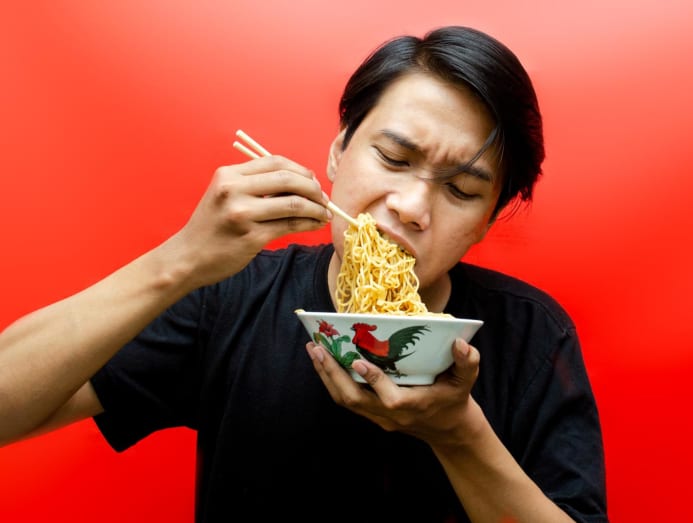
Wolfing down your food is not ideal either. You may not be chewing adequately, which means your stomach has to work harder to digest bigger particles of food, said Dr Beh.
Gastroesophageal reflux disease or GERD is another issue to consider. “Swallowing large amounts of food quickly can cause stomach acid to back up into the oesophagus, leading to heartburn and discomfort”, which are the classic symptoms of GERD, she said.
And you certainly don’t want to choke at dinner, which can occur when you don’t chew your food properly. Incidentally, “there is no specific number of times one needs to chew each bite”, said Dr Beh. “But aiming for around 20 to 30 chews per mouthful is a good guideline,” she said, adding that you might require up to 40 chews for harder, tougher food such as nuts and steak.
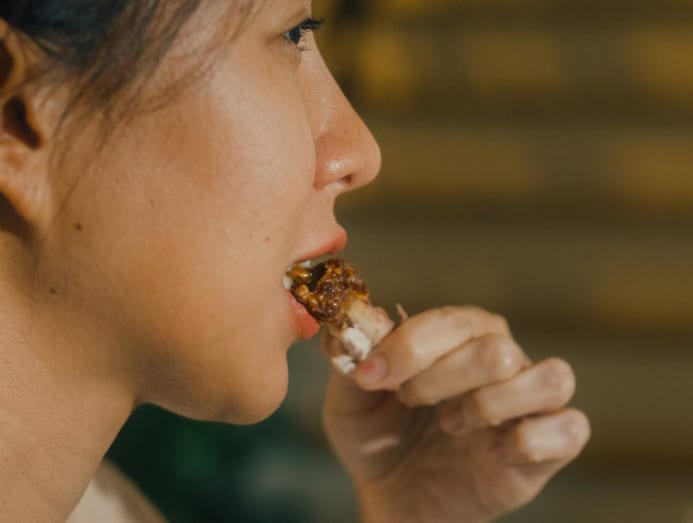
WHAT CAN YOU DO?
For slow and fast eaters looking to eat at a better pace, Dr Beh has the following tips.
To speed up:
- Focus on eating and minimise distractions during mealtimes. Avoid multi-tasking.
- Take slightly larger bites by cutting food into larger pieces or using a larger sized spoon.
- Set a timer to keep track of your eating pace and aim to finish a meal within 30 minutes.
- Avoid overly hot foods. Let your food reach a comfortable temperature before starting to eat.
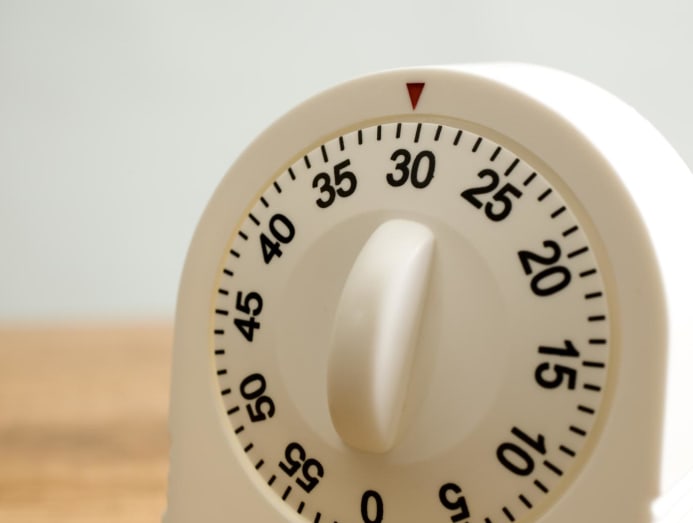
To slow down:
- Pay close attention to the flavours, textures and aromas of the food.
- Aim to chew each bite 20 to 30 times before swallowing. This helps with digestion and allows the body to recognise satiety signals.
- Cut food into smaller pieces. Using chopsticks can also help to slow you down.
- Take a sip of water or beverage after every few bites.
- When eating with others, ask them questions and listen actively to their answers. This allows for breaks from eating.
































